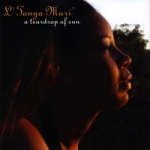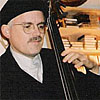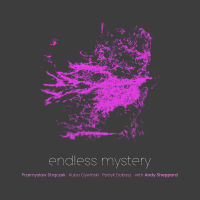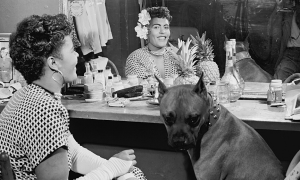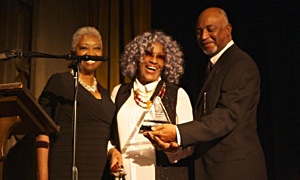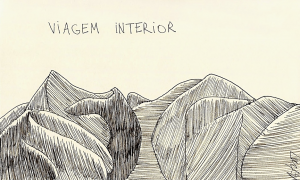Home » Jazz Articles » Music and the Creative Spirit » Ken Vandermark: The Passion and Ascension of a Brilliant Mind
Ken Vandermark: The Passion and Ascension of a Brilliant Mind
LP: When people listen to creative or improvised music, they have difficulty getting by the complexity of the music, in order to get to the emotional element of the piece. Yet within your compositions, there is an emotional element without compromising the music that people can relate to.
KV: It's hard for me to say because there is no way for me to be objective when I'm in the middle of the process. I'm not writing the pieces to please or expand the audience. I'm trying to write these pieces to challenge the players and to expand the possibilities of what I am hearing myself. And hopefully I'm getting to a place where there is more clarity in the ideas and that may be connected to what you are talking about—emotional communication. A band has to play with clarity, a lot of passion, and have an emotional connection to the music that they are playing. It has to be important to them that they are playing this music that has something to say about them as people. An audience can feel that whether they understand or don't understand the material or the history and that has been my goal. To try and create bands and musical situations where that happens.
If you are at a concert where people are there to hopefully have an open mind about what they might experience, you can communicate to them and have an impact on their experience. If the band is not doing its job, which to me is being clear, being connected to the material, and having something to say, then you can't expect the audience to walk away with an impression that they have experienced something that had meaning because the meaning isn't being projected from the band. All of these things you are talking about are really crucial to the overall broader picture of accomplishing of what I hope to do—what I see as the possibility to present improvised music to a much broader audience.

LP: Where does your inspiration come from or what influences your creativity?
KV: I find that I'm inspired by, for lack of a better word, creative thinking. I get really excited by talking with people who have a lot of passion about what they do, and at times it has nothing to do with music at all. The visual arts have had a huge impact on the way I think about music. So it's more about creative thinking. For me to remain creative as a musician, I need my mind inspired and questioned by outside sources. It becomes too insular if everything becomes all about music all of the time. All of the arts are an expression of the individual and the relationship to society. Jazz, as an improvised music, goes even further because it's such a direct expression of whoever I am in this moment. Even if it's a recording, that's who I was at that time very specifically. And if you haven't had any interests or experiences, what's it going to sound like when you play? So I think that without question, the people who are very passionate not just about music but about being alive have very strong ties to other kinds of things outside of music.
LP: You have taken a number of risks in your career. What have you learned about both music and yourself?
KV: I've put the vast majority of the MacArthur money back into the music and a lot of people think I'm crazy. There are economic and artistic risks and to me, those things are not really risks. I think the choices I made about wanting to put my money back into the music was the only clear logical thing to do. Because those things mean that the music can continue and we can have experiences that would otherwise not be possible and that's what the whole point is. Artistically, I feel very strongly that if I'm going to be responsible about what I'm doing as a musician, then I have to do what I have to do and that's not a risk. I don't think it's a risk in the true sense of the word to go out and play the music with the people I play with. Even when I become extremely frustrated to the point of it being painful, those kinds of risks, in the objective light of day, are just part of the job and that's what I'm supposed to be doing. There is a risk that I have only recently become aware of in the last year and that is the risk of my relationship with my wife. This is unfortunate because it shows how slow I am at really seeing outside myself, which is more of a reflection of my selfishness. In order for me to survive artistically and economically, I have to tour. If I stay in Chicago, I cannot make enough money to be of any help at home, so that puts me in a position of where I have to leave.
Consequently, that places a huge amount of stress on my wife Ellen and on our relationship. She's an amazing person and has her own very intense life. She's a doctor and if I'm gone, it's not as if her life is not fulfilling or anything ridiculous like that. It's just something that doesn't get talked about in terms of sacrifice, and I would say that that's the risk of sacrifice that I'm making. I am risking the success of our relationship as two people who really care about each other by going away all of the time. And we work really hard at making it function, but it's a very, very difficult thing. From musical standpoints, I really believe in the process of playing. I've subscribed to that since I started and it's very difficult to say that I can't go out and work with people whose playing and creativity are really important to me. At the same time, I'm not willing to sacrifice my relationship with Ellen in order to continue to play music because I wouldn't be able to continue to play music without her. She's a huge part of why I'm able to do what I do and it's very, very painful and difficult to know how to sort it out. We work very hard on it but I can't say I've found a balance between being away and being home. That's a real balance and that's tough.
LP: You have a reputation of being one of the hardest-driving artists today. You have more projects going on at any given moment than most musicians even think about in a given year. What drives you?
KV: I get really excited about music and it's very difficult to express this in a way that doesn't sound like a romantic exaggeration. My whole sensibility is shaped by music and my interest in finding out what it can do. It's what I do all day and I have to force myself not to be consumed by it, which is one of the healthy things about my relationship with Ellen. I'm motivated by possibilities and nothing is more exciting to me than playing somewhere and realizing the potential of the situation. It's chasing that possibility and each and everyone has a different set of potentials so I can't imagine saying, "I don't want to do that." I just can't even imagine that. I know that there are people who criticize me as being an opportunist and that I overextend myself, but I'm just skimming the surface of what I'm trying to do.
I went through a two-year period where people weren't playing with me when I first arrived in Chicago. That has motivated me to help younger musicians as much as I can because I had a very difficult time when I was first here. I still remember what it was like to not have those opportunities very, very clearly. I have also encountered a lot of things over the last year that has kind of brought this question to the forefront. Two very close friends were diagnosed with cancer and, thankfully; both seem to have made a full recovery. But when someone ten years younger than you is potentially going to die, it really drives some things home. Mats Gustafsson took nearly a half a year off to take stock in what he wanted to do. Peter Kowald passed away before anyone expected and it seemed like he would live forever. And it's strange; I don't have a good answer for what drives me. Maybe it's a type of fatalism along with the knowledge that people I'm close to are going to be disappearing. I feel this overwhelming weight that there's not enough time with a horrible sense of dread that I'll be shut off from all these things that could have been if I had taken the time to do them. And maybe it's fear, but there is something in me that really makes me overly conscious that life is pretty ephemeral. I don't want to be in a position where I've regretted not taking a chance and have not participated in the day.
Photo Credit
Top by Klaus Muempfer
Bottom by Mizuho Yabe
Tags
Ken Vandermark
Music and the Creative Spirit
Lloyd N. Peterson Jr.
United States
Louis Armstrong
Cecil Taylor
wynton marsalis
Ornette Coleman
Charlie Parker
Dizzy Gillespie
Miles Davis
Eric Dolphy
duke ellington
Thelonious Monk
Mat Maneri
Joe Morris
William Parker
Peter Brotzmann
Albert Ayler
Wayne Shorter
Jaki Byard
Philly Jo Jones
Mats Gustafsson
Peter Kowald
PREVIOUS / NEXT
Support All About Jazz
 All About Jazz has been a pillar of jazz since 1995, championing it as an art form and, more importantly, supporting the musicians who make it. Our enduring commitment has made "AAJ" one of the most culturally important websites of its kind, read by hundreds of thousands of fans, musicians and industry figures every month.
All About Jazz has been a pillar of jazz since 1995, championing it as an art form and, more importantly, supporting the musicians who make it. Our enduring commitment has made "AAJ" one of the most culturally important websites of its kind, read by hundreds of thousands of fans, musicians and industry figures every month.



